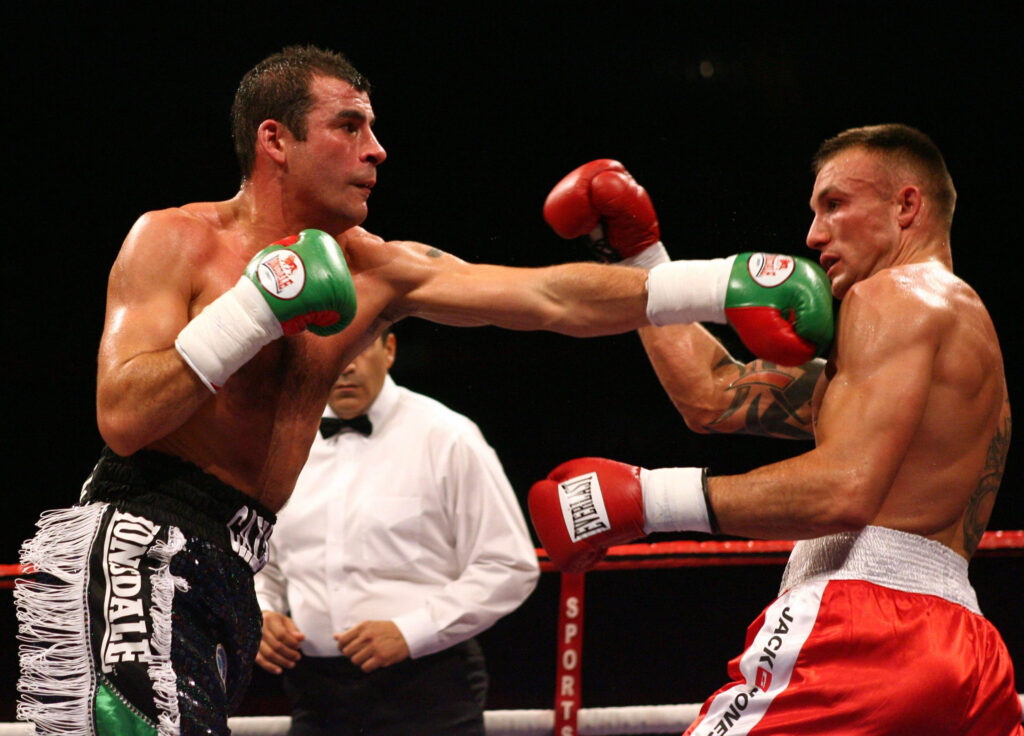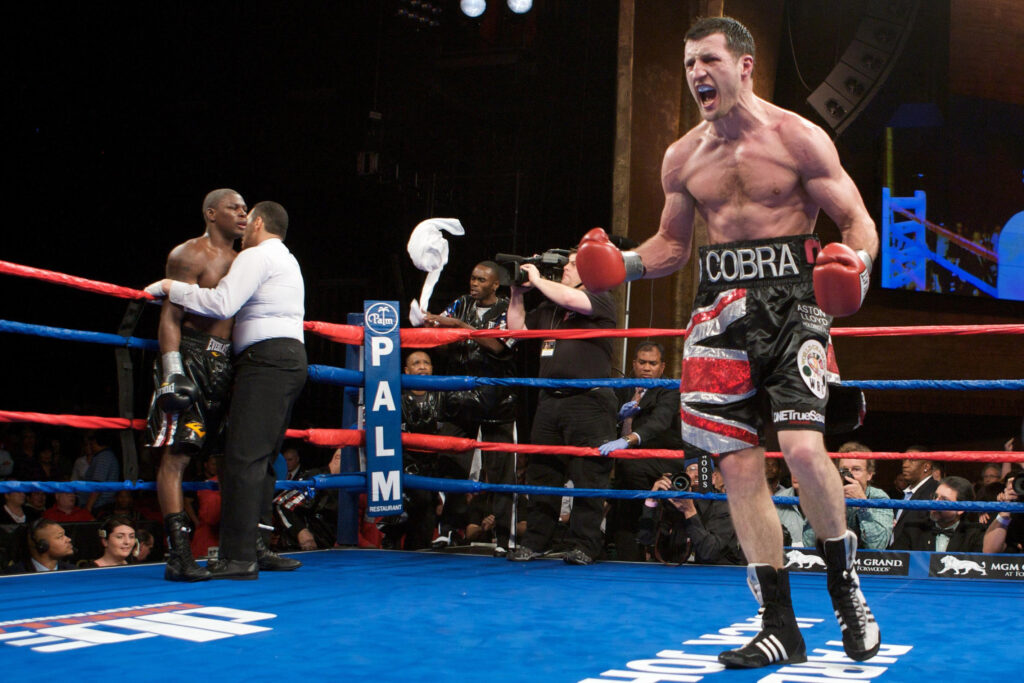Joe Calzaghe is living proof that nice guys can win. Carl Froch could probably wind up the Dalai Lama. The cult of personality shouldn’t matter when determining greatness, but it seems to be a factor when assessing the attributes of Britain’s two best super-middleweights of recent times.
Froch’s often abrasive personality and seemingly bottomless pit of confidence and self-regard rubs many up the wrong way while you’re unlikely to ever hear a bad word about the affable Calzaghe who has been one of the sport’s gentlemen from day one in the business.
But the burning question remains: Calzaghe or Froch – who was the greatest? Both are undoubtedly ‘great’ in their own right, but who leaves the better legacy?
Scroll through social media debate and fight forums and you may now read that Calzaghe (46-0, 32 KOs) is the greatest British fighter of all-time. Modern, more casual, fight fans are intoxicated by that ‘0’ (which generally suggests a career of risk assessment), but that is taking admiration several steps too far. Calzaghe is not even the greatest Welshman, but that’s no slight – Tylorstown’s Jimmy Wilde was the finest flyweight in the history of the sport.
The quality of world champions has been diluted, diluted and diluted again since Wilde’s cut-throat eight-division era with now as many as five title-holders across 17 weight classes. Even 40-50 years ago razor-sharp Brits like Tony Sibson and Chris Finnegan would endure years of toil building up to a world title shot only to meet a dominant, undisputed champion like Marvin Hagler or Bob Foster with no 168lbs safety net inbetween the middle and light-heavyweight divisions. Finnegan and Sibson would easily be world title claimants today, but the records will never show that.
Calzaghe is undoubtedly one of Britain’s best over the last 25 years, coinciding with the rise of the internet and a Sky Sports hype machine that would lead you to believe that sport was invented in 1992 (“Congratulations to Liverpool on their first Premier League title”). Everything before the Premier League seems to have been conveniently scrubbed from the record books to suit a corporate narrative.
A two-weight champion with a flawless record, the Newbridge southpaw was justifiably enroled in the International Boxing Hall of Fame (IBHOF) in 2014 due to notable victories against a peak Mikkel Kessler, the evergreen Bernard Hopkins and that clinic against the solid but over-hyped Jeff Lacy. But crucially from 1998-2005, Calzaghe took the path of least resistance with a long, drawn-out run against a never-ending line of mostly modestly talented challengers with the comfort of home advantage. His best test was probably former WBC champion Robin Reid who pushed Calzaghe to a contested split decision in February 1999.

Mikkel Kessler in 2007. Photo: Nick Potts/Press Association.
You can certainly argue that wasn’t Calzaghe’s fault as back then the 168lbs division was far weaker than Froch’s era of bulls and matadors, but being WBO champion in the higher weights also came with an asterisk in those days. The organisation gradually gained stature with the likes of Marco Antonio Barrera, Oscar De La Hoya and earlier standard bearer Chris Eubank among its champions, but was still struggling for worldwide acceptance. Any undisputed heavyweight championship title bout did not include the WBO version with its claimant never taken seriously. Only a sadist would want to see Lennox Lewis fight Herbie Hide.
The WBO ratings were hardly a murderer’s row of contenders though they did rank a dead fighter Darrin Morris at 168lbs while Calzaghe was champion. Morris even moved up the rankings while deceased and, somewhat surreally, closer to a shot at Calzaghe. The weakness of the WBO’s rankings committee was reflected in many of Calzaghe’s challengers; it’s hard to imagine the likes of Tocker Pudwill, Will McIntyre and Branko Sobot being justified today on a ‘stacked’ card.
While many British fight fans regard Calzaghe’s win over IBF champion Jeff Lacy as a rubber stamp of the Welshman’s greatness, the American’s credentials are open to scrutiny. A growling Lacy certainly looked the part and was being touted as a future superstar, mostly by promoter Gary Shaw, but the American lacks a defining victory. Even in those times, there was a strange deference to American fighters, which eventually dissolved as Team USA produced less and less amateur stars with emerging boxing nations from Eastern Europe rising to the fore.
Raw facts now show that Lacy’s best win before or after Calzaghe was stopping Robin Reid on a seventh-round retirement in 2005 with the Runcorn man’s career drawing to a close. Lacy was a good fighter, but not a great one. Nevertheless, Calzaghe still produced a sparkling performance to dominate the American and finally unify at 168lbs. Belatedly, his career had momentum and he closed it impressively, which is what most people remember.
Defeating a peak Kessler at Cardiff Castle in November 2007 was his crowning glory, with Calzaghe adjusting midway to turn an apparent lost cause into the sweetest of victories while a wafer-thin split decision over a still dangerous Bernard Hopkins has aged exceedingly well with the passage of time. Roy Jones Jr. was long past his best when Calzaghe bowed out with a decision win in November 2008, but who could begrudge him?
Well, Carl Froch would begrudge him. When Calzaghe retired, ‘The Cobra’ seized the mantle of Britain’s premier super-middleweight and carved out a future Hall of Fame career by taking on the most feared 168-pounders of his era in a fine run at elite level. Froch (33-2, 24 KOs) fought (and mostly beat) all-comers.
Unlike Calzaghe, Froch suffered two defeats, but his willingness to face the best on away soil sets him apart from most (only the great Lennox Lewis can better that run from a recent British perspective). We’re back to that ‘0’ again. The belief that an unbeaten fighter is unbeatable is obviously flawed. Should a fighter like Steve Collins, who Calzaghe almost fought in 1997, carry less value because the Irishman endured contentious points defeats on away soil earlier in his career, fighting the best middleweights with the odds stacked against him? A peak Collins would give Calzaghe or any super-middleweight in history fits.
In Froch’s time, the super-middleweight division was far stronger than the comparably pedestrian era of Calzaghe (who followed the Benn-Collins-Eubank-Watson golden period) and, by signing up for the Super Six tournament (a WBSS-style boxing league), the ‘Cobra’ found himself in meaningful encounters from the moment he became WBC 168lbs champion by outslugging future light-heavyweight king Jean Pascal. The French-Canadian would become a fierce competitor at 175lbs where he now holds the WBA Regular title, having enjoyed an ‘Indian Summer’ to his career at 37.
In Froch’s first three world title fights, he was competing at a significantly higher level, often away from home. While Calzaghe would not face a prime American opponent until 2006 in Lacy, nine years after winning the WBO crown, Froch faced one in his first defence, rallying from a late deficit to halt former middleweight champion Jermain Taylor in a breathtaking last round in Connecticut

Photo: Press Association.
The Super Six ensured the major tests kept coming, but Froch didn’t shy away from them. An extremely close call against unbeaten Andre Dirrell was followed by the loss of his WBC crown to Kessler in Denmark. Froch, perhaps inevitably, claimed that his preparations were damaged by the Icelandic volcano eruption that appeared to have cancelled the contest before it was hastily rearranged after the champion had enjoyed ‘several pints of Guinness and a barbecue’ on fight week. Yet he rebounded to thoroughly school a peak Arthur Abraham in Helsinki to become a two-time WBC champion.
Most wrote Froch off after losing a clear decision to arguably the greatest super-middleweight of all-time Andre Ward, again on away territory, yet he became a three-time world title-holder with one of his finest wins, crushing long-reigning IBF champion and sizeable favourite Lucien Bute in five rounds in a performance so intoxicating it prompted a giddy Eddie Hearn to invade the ring before the fight had officially been waved off. Froch signed off by clearly avenging the loss to Kessler and taking the Dane’s WBA Super title before those two stoppage wins over future champion George Groves, the latter in front of a sizeable crowd.
Comparing the two careers, Calzaghe undoubtedly carried the natural talent and longevity, but Froch was rarely in a soft world title fight, apart from a three-round blowout of Yusuf Mack who may have been considered something of a threat compared to the likes McIntyte, Pudwill and Sobot.
Only Kessler, Hopkins and Lacy can be deemed legitimate dangers to Calzaghe during an 11-year reign (both Eubank and Roy Jones were past their peaks) whereas Froch’s fights with Pascal, Taylor, Dirrell, Abraham, Kessler (twice), Ward and Bute were all high-risk assignments carrying no guarantees.
Would Calzaghe have beaten a near-prime Kessler in Denmark and a peak Ward in America? It’s certainly hard to picture the latter scenario.
At their peaks, you’d probably fancy the slicker Calzaghe to outfox Froch over 12 rounds in a close encounter. But having been at Calzaghe’s debut, and ringside for his British title win over Stephen Wilson, early grudge match with Mark Delaney and vacant WBO title triumph over Eubank, I found it maddening how such a clearly brilliant boxer and star performer was allowed to stagnate for so long. Calzaghe is a great fighter though my belief is he could have achieved even more, but for safety-first matchmaking and, of course, those nagging injuries.
If we compare the overall depth of opposition, taking into account home advantage and the degree of risk, Carl Froch had the greater career, however that stings the narrative of newer fight fans.
Looking at cold, hard facts, without any favouritism, Froch’s career resume stands up against any British fighter of the last three decades. The way Calzaghe finished his career was the standard Froch maintained throughout his championship years.
The IBHOF undoubtedly beckons for ‘The Cobra’. Maybe he can have that long-awaited ‘straightener’ with Calzaghe in Canastota. Both are greats, whatever your allegiance or leaning, and most worthy of our appreciation.